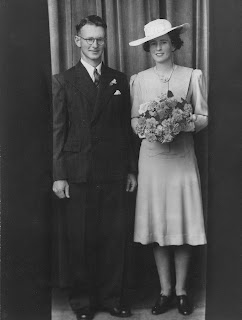 |
| Bob & Freda’s wedding 1947 |
If my parents had been born 70 years later instead of 1912 and 1914, undoubtedly they would have had a university degree, both having an inquisitive mind and a belief in the power of education. Instead, they left school at 14 (Freda) and 15 (Bob) and with no expectation that they’d do other than contribute towards their own keep.
At 18, Freda was told she was adopted and it was time enough to leave home. Bob was more fortunate because although he lived in a church run boys home, the superintendent and his wife, matron were wonderful people who looked after each and every boy and helped them find jobs and accommodation in a Working Boys Hostel in the grounds.
Married in 1946 after Bob returned from military service in Papua New Guinea and Bougainville, they soon produced a family of three, with my being born in 1947.
After Bob finished his vocational education in horticulture and landscape design, and my brother, sister and I all started school, they decided to take it in turns to pursue interests at Worker’s Educational Association (WEA) in Parramatta. Bob chose comparative religion and philosophy whilst Freda chose Australian history.
My mother soon joined the Parramatta &District Historical Society and later, the Hills District Historical Society. She not only went to all the evening meetings but joined in all the day tours and weekends away. She gained enough confidence to become a tour guide on the coaches and spent many an hour researching the places and buildings worth seeing. Later still, she became a guide at Hambledon Cottage, the house built by John Macarthur for his children’s governess and reputed mistress ( my mother used to say “So some people would have you believe!”).
Many a time we children and our school friends tagged along with her on day trips. We poked fun at some of the members, particularly “Mrs Lipstick” as we called her. Of course we called it mum’s Hysterical Society. We got into trouble poking our noses in to things we shouldn’t, like the Leaving Certificate papers in a teacher’s office at the Thomas Street old building which housed King School Boys. Funny how about six of my high school friends showed up that day. We were 16 at the time.
The historical societies impressed upon their members the importance of writing down their own life stories, and although a lot of my mother’s childhood memories were unhappy, she did so. Later, when my father couldn’t sleep during the night, she suggested that he start doing the same, so he did and I later found scraps of information amongst his possessions.
As a teenager, I gave the impression that I was totally uninterested in any form of history apart from what I studied at school, although I now realise I had absorbed a great deal, particularly since I read most of my parents’ historical Australian novels - Eleanor Dark, Xavier Herbert, Barnard Eldershaw and more. My mother used to say it was more worth her while to take my friends on outings than me because they showed more interest!
In 1971, on my first overseas holiday I met my father’s only remaining cousins and aunts in London and rural Devon. Two years later, I found the house in Southampton where my father spent his childhood. However I was too shy to knock on the door. At the same time, my mother explained that her birth mother had given her up in 1912, after arriving from Kent, so she began exploring her own family history.
She also spent hours in the NSW Archives looking up shipping records for not only herself but also for our Grandma (her “adopted” mother)’s early ancestors in Australia on behalf of a Victorian relative.
Meanwhile, I was busy socialising, building my career and studying, so gave no thought to my ancestry. My early years in retirement were busy too, so my mother had died (2004) before I took any interest. But as soon as I did, and the Internet had made it so accessible, I started with the little I knew and quickly became addicted. By 2006 I had found English cousins I had never known existed and my father, by then in his 90s took much pleasure in my findings.
So my addiction to family history research had solid foundations, and I am as interested in much more than their vital statistics. Visiting my ancestral villages and towns, exploring the history and characteristics of those places and getting to know their family lives, work lives, political and religious views is just as important.
I wonder what my mother would have thought about the widespread use of DNA to find cousins and verify our paper records?
Great story and an engaging start to the challenge!
ReplyDeleteThank you Carole.
DeleteHi Margaret - what a great foundation you had. Gosh we need to remember how lucky we have been don't we. When I read of your poor mother being told a) that she was adopted and b) it's time to go all at the same time, I can only imagine the effect that had on her constitution. Obviously she was made of stern stuff. And I love that your parents embraced WEA so enthusiastically. All the best with the challenge this year.
ReplyDeleteThank you Alex. I also read your blog with great interest.
Delete